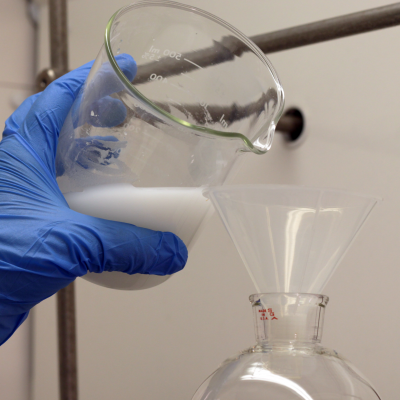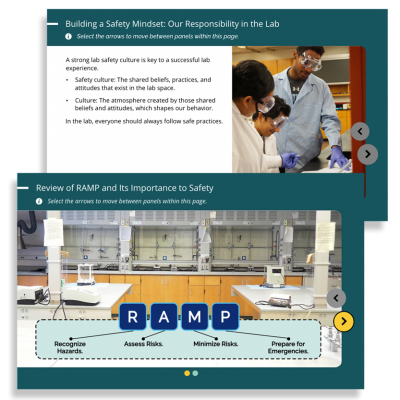ACS Essentials of Lab Safety for Organic Chemistry
Help students gain a deeper understanding of laboratory hazards as they enter the organic chemistry lab

Why ACS Essentials of Lab Safety for Organic Chemistry
ACS Essentials of Lab Safety for Organic Chemistry is a 2-hour on-demand course that exposes students to a deeper level of understanding of general concepts in chemical safety before they perform experiments in the organic laboratory. Using the RAMP framework and an inquiry-based teaching methodology, the course builds on what students will have learned from their general chemistry courses to prepare them for the increased hazards in the organic chemistry lab.

Learning Objectives
- Recognize hazards in organic chemistry labs that learners may not have encountered in the general chemistry lab.
- Explain the additional engineering, administrative, and PPE requirements to minimize the risks of these additional hazards.
- Describe potential emergencies that may occur in the organic chemistry lab.
- Determine what to do in a given emergency situation.

Course Highlights
- Reinforces the importance of a positive safety culture and responsibility
- Reintroduces risk assessment using the RAMP framework
- Introduces students to new hazards to be aware of in the organic chemistry lab
- Builds on the concepts introduced in Essentials of Lab Safety for General Chemistry
- Prioritizes lab safety as a core competency for all students
- Eliminates the additional burden of curriculum development and completion management on faculty and staff
Customer Reviews
Trusted Subject Matter Experts
We have a team of experienced researchers and educators who are committed to delivering up-to-date, high-quality content. Each topic is carefully chosen to demonstrate the crucial safety concepts and skills that every safety leader needs.
Assistant Professor, Monmouth University
Nikita Burrows is a Chemical Education Researcher invested in the development of laboratory curricula and assessments used in the undergraduate chemistry sequence. She has published research articles on student experiences in the undergraduate laboratory and has served in the ACS’s Division of Chemical Education (CHED) research committee.
Professor of Chemistry, Saginaw Valley State University
Jennifer Chaytor is Professor of Chemistry at Saginaw Valley State University where she has been teaching organic chemistry lectures and laboratories for over a decade. Dr. Chaytor has published in several journals including the Journal of the American Chemical Society, Organic Letters, and the Journal of Chemical Education. She is committed to laboratory safety and works to improve the laboratory experience for instructors and students.
Chemical Hygiene Officer, University of North Texas
Amanda Chung recently received her Ph.D. in Chemistry at the University of California, Irvine. There she taught both in-person and online organic chemistry laboratory courses and has organized and taught upper division safety courses. She was the Safety Fellow for the Chemistry department at the University of California, Irvine and served as the leader for the laboratory safety team there. Currently, she is the Chemical Hygiene Officer at the University of North Texas where she aims to promote a safe and inclusive research and teaching environment.
Massachusetts Institute of Technology, MIT.nano
Whitney Hess is the Assistant Director of Safety Systems and Programs for MIT.nano, MIT's state-of-the-art nanoscience and nanotechnology shared research facility. She holds a Ph.D. in Physical Chemistry from MIT and leverages this technical and research background to facilitate the safe conduct of research in MIT.nano laboratories.
Course Outline
This module reviews key concepts in safety culture and the RAMP framework.
- Building a Safety Mindset: Our Responsibility in the Lab
- Recall Past Safety Measures in General Chemistry
- Voicing Safety Concerns in Lab
- Safety Affects Us All
- Review of RAMP and Its Importance to Safety
- Recognizing Common Hazards in the Lab
- Conclusion
This module provides a closer look at Safety Data Sheets (SDS) and what can be learned from them in terms of hazard recognition, minimization of risk, and preparation for emergencies.
- Overview of the SDS
- SDS Highlights
- Locating Information in an Online SDS
- Distinguishing the GHS Pictograms
- Classifying New Chemical Hazards
- Thermal Runaway: 1
- Thermal Runaway: 2
- Organic Solvents and Flammables in the Lab
- Silica and Alumina Dust: Minimizing the Risks
- Conclusion
An introduction to hazards in the organic chemistry lab.
- Selecting the Appropriate Size of Glassware
- Carrying Glassware in the Lab
- Ground Glass Joints
- Common Mistakes with Assembling Glassware
- Different Types of Heat Sources
- Temperature Can Be Deceptive: 1
- Temperature Can Be Deceptive: 2
- Proper Handling of Hot Items
- Cords in the Lab
- Types of Equipment in the Lab
- Summary of Safety Considerations
- Conclusion
This module provides a detailed description of how to assess and minimize risks commonly found in the organic chemistry lab.
- Introduction to Assessing and Minimizing Risks
- Hierarchy of Controls
- Importance of Good Housekeeping
- Chemical Hoods
- Lab Attire
- Eye Protection
- Gloves
- Putting on and Taking Off Gloves
- Waste Disposal
- Where to Put Waste
- Waste Disposal: Points to Remember
- Conclusion
A discussion of handling emergencies that are more commonly found in organic chemistry labs.
- Respond to an Emergency
- Introduction to Preparing for Emergencies
- Situational Awareness
- Responding to Various Emergencies: Spills and Splashes
- Responding to Various Emergencies: Fires
- Responding to Various Emergencies: Glass and Cuts
- What Safety Equipment Should Be Used?
- Conclusion
A holistic situation-based practice assessment.
This is a 10-question quiz. After completing this quiz with a score of 80% or higher, the learner is then allowed to click through to claim their certificate of completion.
Get access
ACS Essentials of Lab Safety for Organic Chemistry is available to academic, corporate, and government institutions. This course can be easily integrated into your existing learning management system (LMS). Request your free 30-day access to evaluate the course.
Get AccessExplore Other Lab Safety Solutions in the Series
System Requrements
In order to use this course in the academic environment, it must be integrated into a learning management system (LMS). Our digital learning solutions are compatible with most commonly used systems such as those specified here. If you don’t see your LMS or the file format that your LMS requires, let your ACS representative know and we will work with you to test your learning environment.
ACS Institute courses are provided in standard eLearning package formats for import into customer Learning Management Systems. The following package format options are available:
• SCORM 1.2
• SCORM 2004 3rd Edition
• AICC
• LTI 1.1
• LTI 1.3v
The following combinations have been tested and verified:
• Moodle / SCORM 1.2
• Canvas / LTI 1.1
• Canvas / LTI 1.3
• Blackboard / SCORM 1.2
• Docebo / SCORM 1.2, SCORM 2004 3rd Edition, LTI 1.1






